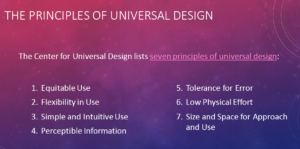
Photo by Terri Bateman
Like Terri, I tried to listen in when I could on the Cascadia Conference this week. So much of the discussions in the Keynotes resonated. Tuesday’s explored ‘care’ in the time of pandemic and beyond. What does that mean and how are we ensuring that this doesn’t become yet another buzz word? There was a great presentation on Universal Design for Learning. It’s inspiring to see how much UDL is becoming part of ‘regular’ conversation and also, somewhat overwhelming. So much can and should be done with current and emergent technologies, and how do we keep up? And how do we support faculty in keeping up? It’s unclear and yet we need to find ways of doing so.

From Cascadia Presentation by Stewart Baker
Wednesday ‘s keynote brought me back to my days of running an MA TESOL Program and teaching a course on World Englishes. All these years later and some issues remain the same. For example. the tension between wanting students to be successful and all the while knowing that sometimes what we teach (e.g., that variety in language, code-switching etc. are the norm) goes against the constraints that bind us into enforcing systems that reproduce another form of colonialism (e.g., the insistence on a specific academic discourse in English). I’m going to explore this Writing for Change Open Education Resource that was shared.
Thursday the keynote was about Ableism and the idea that ‘deep accessibility’ requires focusing more on inherent barriers to learners rather than on accommodations that unintentionally may facilitate the perpetuation of those barriers. The speaker mentioned so many points that we’re struggling with. Consistent labelling of LMS menus and the use of standardized course shells is not a discussion about academic freedom; it’s about the ability of ALL students to access learning in meaningful ways.
In between Cascadia, work on Craft Services, I also watched a couple of webinars on the connections between anti-racism and internationalization. The idea of becoming, ‘comfortable with being uncomfortable’ is one I promote in my Global Studies course. This is the only way we can have the difficult conversations that move us forward.
My mind is now working overtime on ideas on how, moving forward, we can take a different approach to promoting intercultural understanding (one of the 21 Commitments in the Build 2026 plan) and create a Teaching and Learning Intercultural Plan.
There has been a wonderful synchronicity to so many conversations this week – a great way to end April and begin a new month.
Leave a Reply